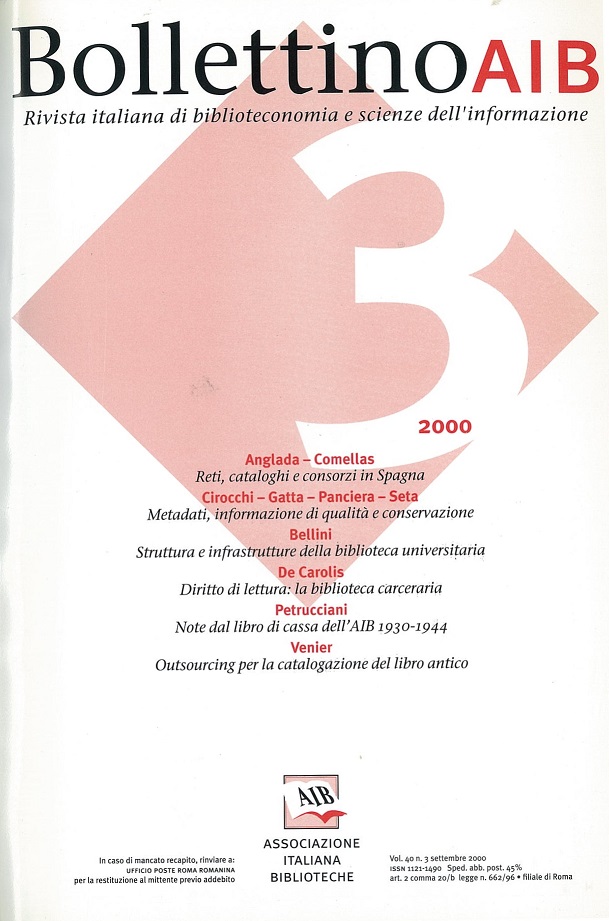For the history of Italian librarians: notes from the accounts book of the Italian Library Association 1930-1944
Main Article Content
Abstract
The history of the Italian Library Association (AIB), established on 11th June 1930, is known in outline, but it has not yet been sufficiently studied for its historical interest, on the basis of the organic, even if not complete, documentation preserved in its historical archives. For the initial period, during the twenty years of Fascism, the documents actually preserved regard almost only the annual conferences. There is also, however, the accounts book kept from the foundation up to January 1944 by Luigi De Gregori, to which this paper is chiefly devoted. During this period, as is well known, the AIB remained under the control of the Ministry for National Education and in particular of the General Direction for Academies and Libraries. By its Statute the main officers were nominated by the Ministry and the others had to receive its approval, but the actual profile of the relations between the Association and the political-administrative hierarchy has yet to be reconstructed.
The accounts book shows that the Association's own resources (membership fees, registration fees for conferences or tours, etc.) form about 21% of the overall budget, to which are added 45% of contributions or reimbursements of the Ministry of National Education and 34% of payments and contributions from other bodies. While the income of the membership fees abundantly covered ordinary management, the ministerial grants were aimed above all at annual conferences and support for the participation of delegations of Italian librarians in international library and documentation conventions. Actually the decisive spur for the birth of a national library association came from the first World Conference of Libraries and Bibliography, held in Italy in 1929, and the AIB undertook especially to guarantee the presence of Italy in the activities of the International Federation of Library Associations: this field saw the encounter of the will of the most expert librarians to become less provincial and the desire of the Fascist regime to exhibit itself on the international scene.
The other Ministerial funding seems basically to be "clearing transactions", at least in the figurative sense, because it includes payments for activities that the AIB entrusted to officials of the Ministry itself and reimbursements for contributions that the Association had granted to other bodies (such as the newly founded Institute of Book Pathology) or to librarians and library employees in personal difficulties. Among the contributions for particular activities, the largest is certainly that for the compilation of the annual Statistics of Italian publications, granted by the Italian Institute of the Book in Florence and then (from 1937 to 1943) by the Academy of Italy.
The expenditure for ordinary management, modest and far inferior to the income from membership fees, allows the partial reconstruction of the daily life of the Association, for example through the expenses incurred from 1934 on for the first headquarter, at the Biblioteca Casanatense in Rome, and for the organization of the office.
These initiatives are the work of Luigi De Gregori, treasurer of the AIB from its foundation, who also gathered together a group of trusted collaborators (among whom Ms Massimi who also looked after the secretariat in the recent past, until 1992) and actually ran all the activities of the Association, always in full agreement with the president, Senator Pier Silverio Leicht. Between compliance with the Regime and contrasts with the political and bureaucratic hierarchy, Leicht and De Gregori managed to guarantee the possibility, especially in the annual conferences, of an open professional debate and of raising in the press the most important library questions, from the need for a true great national library to that for modern public libraries, for everyone, in every part of Italy.
The fall of Fascism (25 July 1943) also brought an end to the activities of the Association, but already under the German occupation of Rome (September 1943-June 1944) some librarians (Francesco Barberi, Maria Ortiz, etc.), while giving their modest contribution to the resistance, began discussing about "old" and "new" association of Italian librarians.
Article Details

This work is licensed under a Creative Commons Attribution-ShareAlike 4.0 International License.
